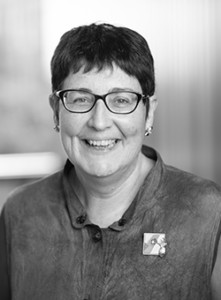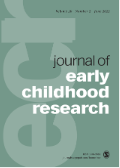Associate Professor Jennifer Cartmel works in a niche area, being one of the only full time academics in Australia undertaking research in outside school hours care services (OSHC), alongside her colleague Bruce Hurst.
Jennifer is the Associate Editor for the International Journal of Playwork Practice, and is very interested in play work, not just in how it threads through curriculums, but in the academic world.
Jennifer says:
“I think it’s important to be playful with ideas. While as academics, we might not be physically engaging in playful behaviours, it’s important to be playful with research insights and theoretical perspectives. Thinking about the playful ways we construct meanings to provide insights about our work with children and children’s services.”
 Jennifer has been involved in a wide range of research projects focusing on children’s social and emotional learning and the workforce in children’s services including childcare settings and human service organisations. Outside school hours care sits alongside the school sector, and historically schools have not necessarily been expected to embrace the wellbeing, development and learning children undertake in these settings.
Jennifer has been involved in a wide range of research projects focusing on children’s social and emotional learning and the workforce in children’s services including childcare settings and human service organisations. Outside school hours care sits alongside the school sector, and historically schools have not necessarily been expected to embrace the wellbeing, development and learning children undertake in these settings.
This perspective is changing as the community has greater understanding about the length of time children spend in outside school hours care. Time spent in outside school hours care services may be equivalent to the time spent in school over the period of a year. Perspectives about children’s experiences in outside school hours care has shifted between education and community services. Jennifer completed her PhD on the relationship between schools and outside school hours care.
“I thought it would help broker a better relationship, but it’s only now that I’m starting to see a stronger interest in that area. This is due to people’s understanding of children and childcare. There’s a perception that OSHC is another institution, whereas in reality for a lot of children, it is different. There’s also the perception that people are there for a short period of time, so it’s less important. But for many kids it’s a significant part of their week. Changing that community perception is really important.”
On the importance of OSHC, Jennifer says:
“The question is often asked: Is it a community service or related to children’s wellbeing and learning? Outside school hours care is an under researched area, and there are lots of assumptions made about the time spent in outside school hours care. Increasingly outside school hours care services are viewed as the ‘new neighbourhood of childhood.”
This year she will lead a research team to examine the didactics of practice in outside school hours care. This will contribute to an international network that’s been funded by the Swedish Research Council, to compare understandings about the practice of educators in outside school hours care settings
On this she says:
“When policy decisions are made about OSHC, there’s not a lot of information to call on. We’re hoping this project will tell us a little bit more about what actually happens to underpin programs of study for the work force in outside school hours care.”
Currently educators in OSHC can have a broad range of qualifications, which Jennifer says is really useful as it fits with the kinds of programs offered in outside school hours care.
“We have people with qualifications child care, playwork, education, nursing, psychology, and the like. You need to be a little bit of everything to be an OSHC person. The workforce is made up of a diverse group of skillsets.”
Jennifer is hardworking and passionate about this area of research. She wrote My Time Our Place The Framework for School Age Care in 2011 and is part of a consortium currently updating this. She also put in a successful bid for the World Education Research Association, International Network for Extended Education to be hosted in Brisbane in 2024.
In her “spare time” she works with the Australian Institute of Intergenerational Practice. She was drawn into a Griffith interdisciplinary team, to be Education Lead on projects about intergenerational practice. This combines her interests in early childhood and outside school hours care with working with older people. This has been rewarding in many ways.
“I’ve learnt there’s mutual reciprocity, and the benefits for children should never be underestimated. There’s been a lot of research on the benefits for older people, but not so many on the benefits for children. Using a lot of observational data, we have seen how it benefits children’s confidence, language and empathy. All of this grows through participating in inter-generational programs.”
Read more about Jennifer’s fascinating and extensive research in this area here.




